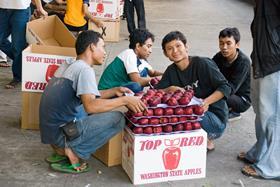
The Washington apple industry is eagerly anticipating improved access to the Indonesian market after the WTO upheld its ruling that the South East Asian country’s import licensing regimes for horticulture products are inconsistent with global trade rules.
Indonesia lost an appeal ruling at the WTO on Thursday in a dispute with the United States and New Zealand over its restrictions on food imports, including horticulture and animal products.
Indonesia had argued that the rules, which were introduced in 2011/12, were based on health concerns and Halal food standards, or aimed at dealing with temporary surpluses on the domestic market, according to a report from Reuters. In December 2016, a panel of adjudicators on the WTO Dispute Settlement Body faulted Indonesia, which subsequently appealed.
Indonesia’s import licensing regime and quota system have hampered access for international fresh fruit suppliers, not least Washington apple shippers, which count Indonesia as their largest market in South East Asia. Prior to the restrictions, Washington apple exports to Indonesia had been as high as US$50m, according to the Washington Apple Commission (WAC). After regulations took effect, shipments dropped by as much as 50 per cent in subsequent seasons, with market values correspondingly hit.
Under the regime, imports are allowed in two six-month timeframes through a permit-quota system. “We estimate we’ve been losing eleven weeks’ shipping time each year because of the process of applying for and receiving permits and then ensuring shipments arrive before the permits expire,” WAC president Todd Fryhover told Asiafruit.
Fryhover is hopeful the WTO ruling will translate to improved market access in time for the forthcoming Washington apple campaign. “We recognise that no country has to comply with WTO rulings; they can always choose not to adhere,” noted Fryhover. “But Indonesia has been a good steward of trade in the past. There will have to be a new import system put in place, and the timeline for that is up in the air.
“Indonesia has always been a wonderful consumer of Washington apples, and we have excellent supplies for increased shipments to Indonesia this season,' he added.
Mark Powers, president of the Northwest Horticultural Council Market Council, which represents the industry on trade access issues with USDA and other government agencies, also singled out the US Trade Representative Office for their work in achieving the positive ruling.
“NHC is very appreciative of the hard work and multiple-year effort undertaken by the Office of the US Trade Representative (USTR) to enforce the trade rules agreed to by all WTO members,” he said. “This is the perfect example of the positive work USTR does to keep global markets open and allow our growers to sell 30 per cent of their crop overseas.”
Washington apple growers and shippers won’t be the only ones enthused by the opportunities the ruling presents for improved access to the Indonesian market. New Zealand, which invoked the WTO dispute settlement proceedings, saw exports of key horticultural product such as apples and onions drop by as much as 80 per cent after the trade restrictions were imposed, and a wide range of global suppliers and products have seen their trade badly impacted.
During 2016, Indonesia imported close to 450,000 tonnes of fruit valued at US$780m. While volumes were up 10 per cent on the previous year, they were still down by some 40 per cent on the peak years of 2011 and 2012 when Indonesia imported around 750,000 tonnes of fruit before the government introduced its range of import policies.



